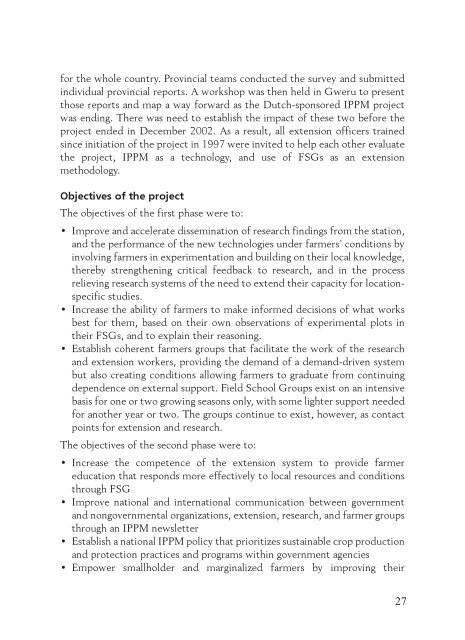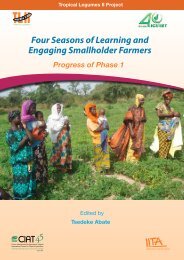Integrated Soil Water and Nutrient Management and Dry ... - Icrisat
Integrated Soil Water and Nutrient Management and Dry ... - Icrisat
Integrated Soil Water and Nutrient Management and Dry ... - Icrisat
You also want an ePaper? Increase the reach of your titles
YUMPU automatically turns print PDFs into web optimized ePapers that Google loves.
for the whole country. Provincial teams conducted the survey <strong>and</strong> submitted<br />
individual provincial reports. A workshop was then held in Gweru to present<br />
those reports <strong>and</strong> map a way forward as the Dutch-sponsored IPPM project<br />
was ending. There was need to establish the impact of these two before the<br />
project ended in December 2002. As a result, all extension officers trained<br />
since initiation of the project in 1997 were invited to help each other evaluate<br />
the project, IPPM as a technology, <strong>and</strong> use of FSGs as an extension<br />
methodology.<br />
Objectives of the project<br />
The objectives of the first phase were to:<br />
• Improve <strong>and</strong> accelerate dissemination of research findings from the station,<br />
<strong>and</strong> the performance of the new technologies under farmers’ conditions by<br />
involving farmers in experimentation <strong>and</strong> building on their local knowledge,<br />
thereby strengthening critical feedback to research, <strong>and</strong> in the process<br />
relieving research systems of the need to extend their capacity for locationspecific<br />
studies.<br />
• Increase the ability of farmers to make informed decisions of what works<br />
best for them, based on their own observations of experimental plots in<br />
their FSGs, <strong>and</strong> to explain their reasoning.<br />
• Establish coherent farmers groups that facilitate the work of the research<br />
<strong>and</strong> extension workers, providing the dem<strong>and</strong> of a dem<strong>and</strong>-driven system<br />
but also creating conditions allowing farmers to graduate from continuing<br />
dependence on external support. Field School Groups exist on an intensive<br />
basis for one or two growing seasons only, with some lighter support needed<br />
for another year or two. The groups continue to exist, however, as contact<br />
points for extension <strong>and</strong> research.<br />
The objectives of the second phase were to:<br />
• Increase the competence of the extension system to provide farmer<br />
education that responds more effectively to local resources <strong>and</strong> conditions<br />
through FSG<br />
• Improve national <strong>and</strong> international communication between government<br />
<strong>and</strong> nongovernmental organizations, extension, research, <strong>and</strong> farmer groups<br />
through an IPPM newsletter<br />
• Establish a national IPPM policy that prioritizes sustainable crop production<br />
<strong>and</strong> protection practices <strong>and</strong> programs within government agencies<br />
• Empower smallholder <strong>and</strong> marginalized farmers by improving their<br />
27

















